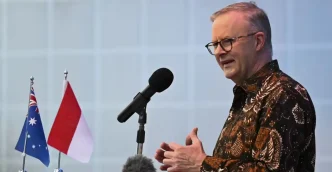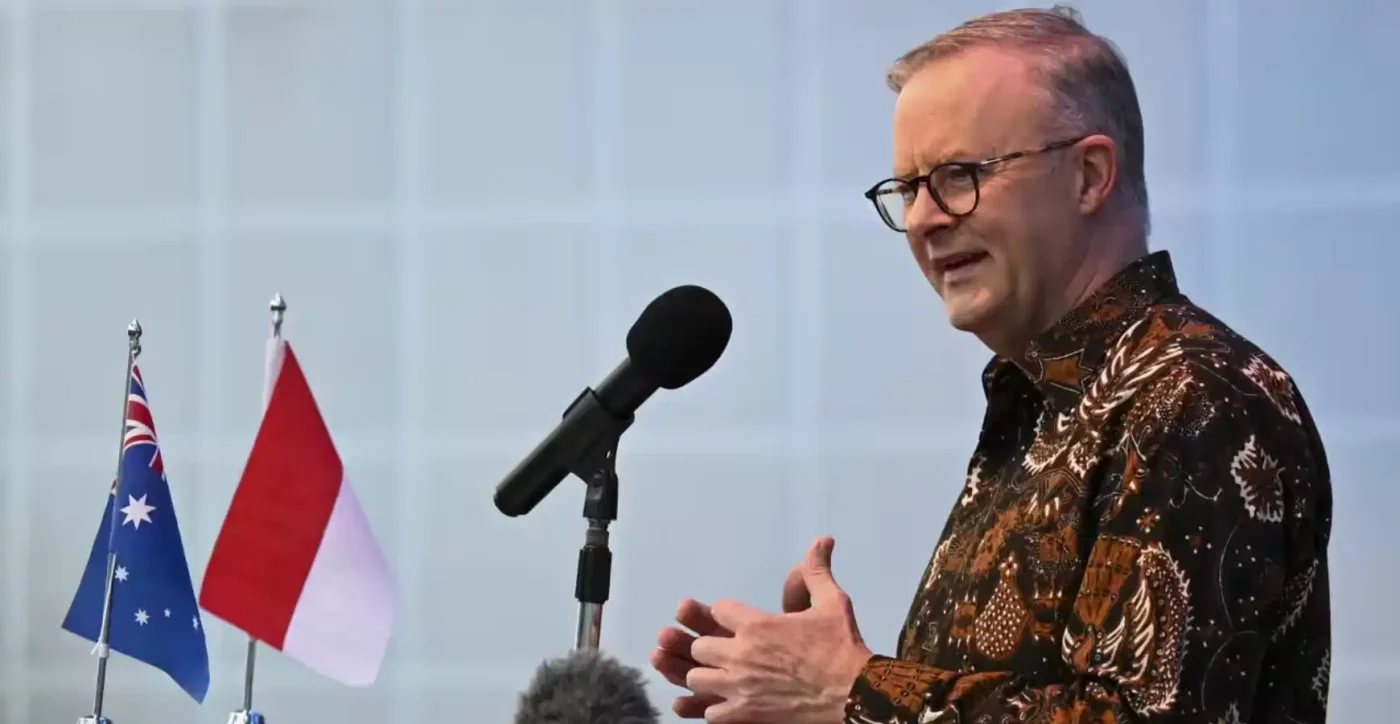Jakarta is set to host Australian Prime Minister Anthony Albanese on May 14-15 for the Australia-Indonesia Annual Leaders’ Meeting, a visit that underscores the strategic importance of bilateral ties between the two nations. Coming just days after Albanese’s reelection, the trip marks his first international engagement in his new term, signaling the priority Canberra places on its relationship with Indonesia, a rising economic and geopolitical power in the Indo-Pacific region.
Strengthening a Strategic Partnership
The visit, confirmed by Indonesia’s Foreign Affairs Ministry spokesman Rolliansyah “Roy” Soemirat, is expected to focus on deepening cooperation in key areas such as economic development, food security, energy resilience, and trade. “Indonesia welcomes the visit of PM Albanese on May 14-15” said Soemirat, highlighting the significance of the engagement. He added that discussions between Albanese and President Prabowo Subianto will also address priority issues for the new administrations in both countries, alongside regional and global challenges.
Australia and Indonesia have enjoyed a robust relationship since upgrading their ties to a Strategic Comprehensive Partnership in 2018, followed by the Indonesia-Australia Comprehensive Economic Partnership Agreement in 2019. These frameworks have facilitated closer collaboration on economic and security fronts, positioning Indonesia as one of Australia’s most critical regional partners. Albanese himself emphasized this during an interview with the Australian Broadcasting Corporation (ABC) on May 7, stating, “We have no more important relationship than Indonesia.” He also described Prabowo as a “good friend” on a personal level, reflecting the warmth and trust underpinning their diplomatic interactions.
The economic dimension of this partnership cannot be overstated. Indonesia, projected to become the world’s fourth-largest economy in the coming decades, offers vast opportunities for Australian businesses, particularly in agriculture, energy, and infrastructure. Albanese’s remarks to the ABC underscored this potential, noting that the Indo-Pacific is “the fastest-growing region of the world in human history.” Enhancing trade ties under the 2019 economic agreement will likely be a central topic during the summit, with both leaders keen to ensure mutual benefits in a rapidly evolving global market.
Security and Defense on the Agenda
Beyond economics, defense and security cooperation will also feature prominently in the discussions. Australia and Indonesia share common interests in maintaining stability in the Indo-Pacific, a region increasingly marked by geopolitical competition and maritime disputes. Their collaboration on counterterrorism, border security, and maritime safety has been a cornerstone of their strategic partnership, with joint exercises and intelligence-sharing initiatives strengthening mutual trust.
However, recent unverified reports have introduced an element of uncertainty into the security dialogue. During Australia’s election campaign in April, a rumor circulated within political and defense circles that Russia had sought permission to base long-range bombers and fighters at an Indonesian air force base in Biak, Papua. The claim, which raised eyebrows in Canberra, was swiftly denied by both Indonesia’s Defense and Foreign Ministries. While the report remains unsubstantiated, it highlights the sensitivity of military alignments in the region and the potential for misinformation to strain bilateral relations. If confirmed, such a development could have significant implications for regional security dynamics, though no evidence currently supports the allegation.
The Albanese-Prabowo meeting offers an opportunity to address these concerns directly, ensuring that both nations remain aligned on key security issues. Analysts suggest that Australia may seek reassurances from Indonesia regarding its defense policies, particularly in light of Jakarta’s non-aligned stance and its growing engagement with other global powers, including China and Russia. For its part, Indonesia is likely to emphasize its commitment to sovereignty and regional stability, reinforcing its role as a balancing force in the Indo-Pacific.
A Tradition of Engagement
Albanese’s choice of Indonesia as his first bilateral destination after reelection aligns with a long-standing Australian tradition of prioritizing Asia, and Indonesia in particular, in foreign policy. This practice reflects not only geographic proximity but also the recognition of Indonesia’s pivotal role in shaping regional outcomes. As Albanese noted in his ABC interview, the visit is “a signal to our region of the importance that we place on this region.” His decision to travel to Jakarta just one day after his new government’s swearing-in on May 13 further underscores this commitment.
The personal rapport between Albanese and Prabowo, who transitioned from Defense Minister to President following Indonesia’s recent elections, adds a layer of continuity to the relationship. Their interactions, including a notable meeting in Canberra on August 20, 2024, have been characterized by mutual respect and a shared vision for closer ties. This personal connection could facilitate frank discussions on sensitive topics, from trade imbalances to security concerns, during the upcoming summit.
Regional and Global Context
The Australia-Indonesia summit takes place against a backdrop of heightened regional activity, with Indonesia also preparing to host Chinese Premier Li Qiang on May 24-25 and French President Emmanuel Macron on May 27-28. These visits, coinciding with the ASEAN Summit in Kuala Lumpur on May 26-27, highlight Jakarta’s growing prominence as a diplomatic hub. For Australia, maintaining a strong partnership with Indonesia is crucial not only for bilateral reasons but also for navigating broader regional dynamics, including China’s expanding influence and ongoing tensions in the South China Sea.
Both leaders are expected to discuss their respective roles in ASEAN and other multilateral forums, exploring ways to coordinate on issues such as climate change, cybersecurity, and economic recovery post-pandemic. Indonesia’s leadership within ASEAN, combined with Australia’s position as a key dialogue partner, offers a platform for joint advocacy on shared priorities. This alignment could prove particularly important as global challenges, from supply chain disruptions to geopolitical rivalries, continue to test the resilience of regional cooperation.
Economic Opportunities and Challenges
Delving deeper into the economic agenda, the summit is likely to address specific initiatives aimed at boosting investment and trade. Australia has long been a major exporter of agricultural goods and resources to Indonesia, while Indonesian markets offer Australian companies access to a population of over 270 million. However, barriers such as regulatory differences and infrastructure gaps remain obstacles to fully realizing the potential of the 2019 economic partnership agreement.
Energy resilience, a priority for both nations, could emerge as a key area of collaboration. Indonesia’s ambitious plans to transition to renewable energy, coupled with Australia’s expertise in clean technologies, present opportunities for joint projects. Similarly, food security—a pressing concern amid global supply chain uncertainties—may prompt discussions on agricultural cooperation, with Australia’s advanced farming techniques complementing Indonesia’s vast arable land.
Trade figures further illustrate the stakes. Bilateral trade between the two countries reached significant levels in recent years, though exact figures for 2025 are yet to be finalized. Initiatives to reduce tariffs and streamline customs processes under the economic partnership agreement could unlock further growth, benefiting industries on both sides. For instance, Australian exporters of beef and wheat stand to gain from increased access to Indonesian markets, while Indonesian manufacturers could see expanded opportunities in Australia.
Looking Ahead
As Anthony Albanese and Prabowo Subianto prepare to meet in Jakarta, the stakes for Australia-Indonesia relations are higher than ever. Their discussions will not only shape the trajectory of bilateral ties but also influence broader regional stability at a time of uncertainty. From economic cooperation to security coordination, the outcomes of this summit could set the tone for collaboration in the years ahead.
For now, the visit stands as a testament to the enduring partnership between Canberra and Jakarta, one built on shared interests and mutual respect. As both leaders navigate the complexities of their respective domestic agendas and the challenges of a dynamic Indo-Pacific, their commitment to dialogue offers hope for continued progress. Whether this summit will yield concrete agreements or simply reaffirm existing ties remains to be seen, but its significance as a marker of strategic alignment is undeniable.















